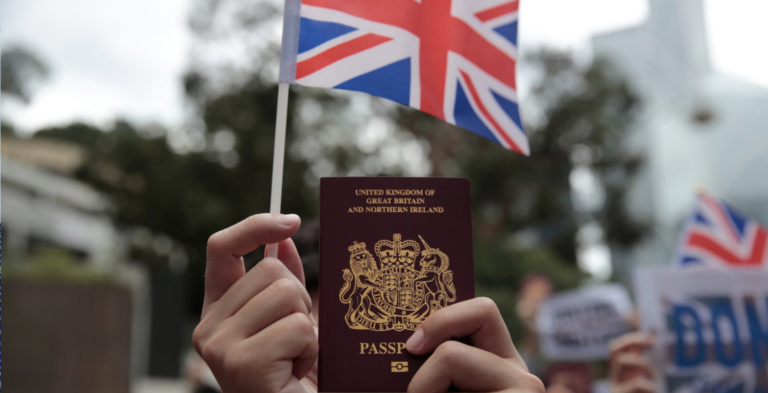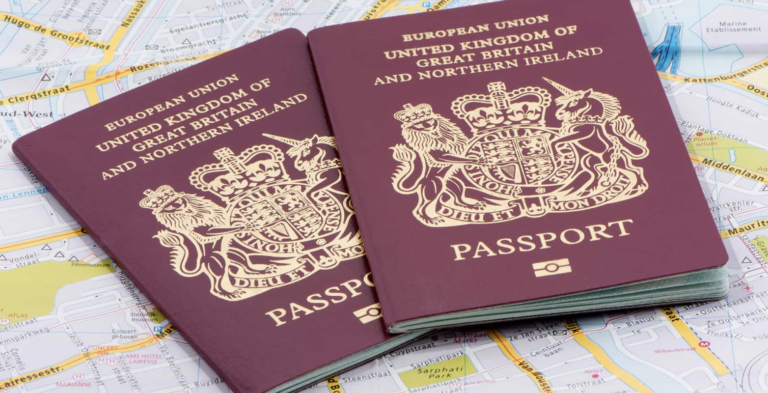Deportation from the UK: The Basics You Need To Know

What is Deportation?
Deportation is a legal process in which a foreign national (an immigrant) is removed forcefully from the territory of the United Kingdom. The Home Office has the power to start deportation proceedings if a migrant has committed a crime or is considered a threat to the public good. If the Home Office enforces deportation, they can bar such a person from returning to the UK indefinitely.
Deportation should not be confused with administrative removal. While the deportation process in the UK typically occurs due to criminal activity, administrative removal is enforced when an individual lacks permission to reside in the UK. Administrative removal is possible when the person’s visa has expired. Should an individual be obligated to leave the country, the Home Office is required to provide a period of notice and allow time to challenge the decision.
If you have been informed by the Home Office that they may make a deportation order, consider seeking legal counsel from an experienced immigration lawyer, such as those practicing at Sterling Law. A professional immigration specialist will provide invaluable guidance to help you understand your legal options and safeguard your right to stay in the country.
Exploring the Differences: Voluntary Departure and Forced Departure from the UK
According to the current UK deportation law, there are two common ways in which an individual may be required to leave the country – through voluntary departure or forced deportation. There are significant differences that every non-national in the UK should be aware of.
Voluntary Departure
Voluntary departure or voluntary deportation UK is an option provided by the UK government to deport migrants who are considered to be in the country illegally or who have overstayed their visas. This option allows such persons to go away from the country willingly, without being removed by force.
Voluntary departure is usually granted after an individual has been issued a letter of intention to remove, which outlines the reasons why the government believes the person should leave the country and the consequences if they fail to do so.
Voluntary deportation from the UK is more beneficial compared to a forced one because it allows individuals to leave the country on their own terms and potentially avoid being banned from re-entering the country in the future.
Forced Deportation
Forced deportation from the UK occurs when an individual is forcefully expelled from the UK by the government. This is typically the result of a Home Office decision that the foreigner has committed a serious criminal offence, presents a public danger, or poses a threat to national security.
People who are forcibly deported are usually detained by the government until their deportation can be arranged. This can be a traumatic and stressful experience, as individuals are often taken to detention centres where they have limited access to legal representation, family, and friends.
One of the most significant differences between voluntary departure and forced deportation is the impact that it has on an individual’s future immigration status. People who are forcibly deported are often banned from returning to the UK for a certain period, and in some cases, may be permanently barred from entering the country.
Grounds for Deportation from the UK
The Home Office has several legal provisions that allow the government to carry out the process of immigration deportation for those convicted of an offence.
Deportation Rules in the UK
UK immigration laws have provisions that enable the Home Office to deport non-residents who are convicted of an offence. Some of these legal provisions are as follows:
- Conviction of a Sentence of More Than 12 Months. If a foreigner is convicted of an offence and their sentence exceeds 12 months, the Home Office can initiate a deportation process. If a migrant commits something that could endanger the safety of the public, the Home Office might decide that it’s best to deport them as a way to protect the community. The reasoning behind this decision is that allowing the offender to remain in the country could be a serious threat to the well-being and safety of its people.
- Cumulative Sentences Exceeding 12 Months. If a foreigner in the UK is found guilty of multiple crimes that result in a total sentence surpassing 12 months, the Home Office is authorized to commence deportation proceedings.
- Persistent Offender. Persistent offending is among the reasons for deportation. Someone who keeps breaking the law over and over again is called a persistent offender, and they can be really dangerous to society. They don’t seem to care about the rules, and they keep committing crimes. This can have a huge impact on local citizens’ lives because they can get hurt, feel terrible, or lose money because of what the offender did. Notably, a person can be classified as a persistent offender even if they haven’t spent time in jail. Factors, such as the number of offences, their seriousness, and when they took place, are all considered. But, if such a person participates in a rehabilitation program to address their destructive behaviour, it could potentially prevent them from being ejected from the UK.
- Deportation Conducive to the Public Good. This is a legal procedure used to remove foreign nationals who pose a risk to the UK’s society or economy. This process is not solely based on ensuring public well-being and security, but also takes into consideration factors, such as an individual’s criminal history or involvement in activities that are detrimental to the country’s social norms and values. Deportation for the public good is used by the UK government to maintain national sovereignty and protect citizens from harm caused by undesirable migrants.
In the UK, a deportation order is a legal directive issued by the Home Secretary, the head of the Home Office that is responsible for immigration law and policy. The deportation order is an official command stating that a foreign national must be expelled from the country because they are considered to be a potential danger or their presence is not favourable to society. Once the order is issued, the individual is obligated to leave the country and may be prohibited from re-entering for a specific period.
Sterling Law immigration solicitors are well-equipped to assist individuals who have been served with a deportation order in the UK. If you have received such an order, you do have the right to challenge it by lodging an appeal with the first-tier tribunal. However, you must act swiftly and submit the appeal within 28 days of receiving the deportation order. In the event that the appeal is unsuccessful, there may still be recourse by way of appealing to the upper tribunal or seeking a judicial review. To navigate this complex process, it is prudent to engage the services of an experienced immigration lawyer who can provide expert guidance and assistance.
Can You Be Deported If You Are A British Citizen?
Answering the question “Can a British citizen be deported”, deportation from the UK is commonly not possible for local nationals. Still, the Home Office may seek to strip individuals of their British citizenship under extreme circumstances. This would no longer classify the individual as a British national, opening up the possibility of deportation from the UK. This scenario is highly limited and typically only applicable to utterly serious crimes.
Migrants holding an Indefinite Leave to Remain (ILR) are not immune to deportation either. Should an individual commit a serious crime, the Home Office can pursue criminal deportation proceedings, even if they have valid ILR.
What Does the UK Deportation Process Look Like?
Deportation from the UK usually begins with a written notification from the Home Office, known as a “Notice of intention to Deport.” This paper is sent to foreign criminals, who are serving their sentences, and outlines the reasons why the Home Office is seeking to deport them from the country.
Upon receipt of the letter, the individual has the opportunity to raise any grounds as to why they should not be deported. The Home Office will then consider these grounds and decide whether or not to proceed with the deportation process in the UK.
If the Home Office decides to pursue deportation, it will issue a refusal decision along with a deportation order. Though, if the refusal decision engages human rights or protection-based arguments, the individual will have the right to appeal the deportation decision.
The case can then proceed to an appeal before a judge at the First Tier Tribunal. The individual has 14 days from the date of receipt of the notice of intention to deport to file a notice of appeal with the First Tier Tribunal. The Immigration Judge will then hear the appeal and decide whether or not the deportation is in accordance with the law.
At Sterling Law, we understand the complexities involved in the deportation process and have extensive experience in helping clients through each stage. We provide expert advice and representation to ensure that our clients’ best interests are protected throughout the process.
If you or someone you know has to contend with deportation and requires assistance, contact us for further advice and legal assistance. Our team of experienced immigration lawyers is here to help you out through all the struggles of an immigration deportation process in the UK.
What Are Your Options If You Receive A Deportation Order?
If you have received a deportation order from the Home Office, it can be a daunting and overwhelming experience. However, there are legal options available to you to avoid being kicked out from the country. Seeking advice from reputed immigration solicitors, such as Sterling Law, can help you understand your rights and the legal routes available to challenge the decision.
Challenging the UK deportation order should be the first step to take. Before doing so, it is vital to check if you fit into any of the exemptions to deportation. If you do, an immigration solicitor can help you request a review of your case and provide evidence to support your exemption.
Exemptions for deportation from the UK exist for certain individuals. Specifically, British citizens, British Overseas Territories citizens, and Commonwealth or Irish citizens who have resided in the UK for five years or since January 1, 1973, may be exempt from deportation. Additionally, individuals with a right to abode may also be exempt. Knowing these exemptions can help foreign nationals better understand their rights and potential options in the event of deportation proceedings.
What if You Do Not Fit Into the Exemption Criteria from Deportation UK?
Failure to meet the UK deportation exception criteria does not mean that you are not able to challenge the deportation order. There are several grounds on which an individual can stand on their right for remaining in the UK:
- Violation of Human Rights. If a person can demonstrate that their removal would contradict the foundations of Article 8 of the European Convention on Human Rights, they can avoid deportation because this, otherwise, would result in significant interference with their family or private life. This may be the case if the deportee has close family bonds in the UK, such as a spouse or children, or if they have lived in the UK for a long while and have established strong social and cultural ties.
- Asylum. An asylum is a form of protection granted by a country to individuals who have fled persecution or fear persecution in their native country. If someone is granted asylum or has a pending asylum claim, they may be considered exempt from deportation in the United Kingdom. This means they cannot be sent back to their home country, where they may face harm or danger. Seeking asylum can be a complex process, and it is essential to seek legal assistance to understand your rights and obligations.
- Family Life. Family life is a key consideration for those facing deportation from the UK. In case you maintain a genuine and ongoing relationship with your family members who hold British citizenship or settled status in the United Kingdom, you might qualify for exemption from deportation. If you can prove that your deportation would cause serious harm to your family members or breach their human rights, you may be allowed to remain in the UK.
- Length of Residence. In the UK, individuals who have been residing in the country for a significant period and have established strong ties within the community may be granted an exemption from deportation. This exemption is typically granted to individuals who can demonstrate that their removal from the UK would result in significant hardship, both for themselves and their families. Factors such as the length of time spent in the UK, family ties, and community involvement may all be taken into consideration when assessing eligibility for exemption from deportation.
- Medical Conditions. The exemption is usually granted when an individual’s medical situation makes it impossible for them to receive the necessary treatment in their home country, thereby putting their health and well-being at risk.
How to Appeal if the Challenge of Deportation is Unsuccessful?
If your challenge against deportation is unsuccessful, you may still be able to appeal the decision in certain circumstances. Although you should realize that there is no automatic right of appeal under current immigration rules, there are a restricted number of exclusions that could potentially enable an appeal to be pursued. For instance, if you hold pre-settled or settled status under the EU Settlement Scheme (EUSS) or have a legally valid EUSS family permit, and a deportation order was issued against you at or after 11 pm on January 31, 2020, you may qualify for an appeal.
Additionally, if you can show that there are human rights or protection grounds that apply to your case, you may be able to bring an appeal. In any event, it is essential to seek the advice and representation of an experienced immigration lawyer who can guide you through the process and help you prepare a strong case.
What If the Appeal Does Not Bring Any Positive Results?
If you are unable to overturn a deportation decision in the UK, you can pursue a judicial review (JR). A JR is a legal mechanism that allows individuals to challenge the legitimacy of a decision made by a public entity, such as the Home Office. In the context of a deportation case, a person may claim that the decision was made unlawfully or that their fundamental rights have been infringed upon.
However, applying for a judicial review is a complex and expensive process that should only be pursued after seeking legal advice from a qualified immigration lawyer. Remember, the court may reject the application if it does not meet certain criteria or if there are no legitimate grounds for the review. Nonetheless, for those who have exhausted all other legal avenues, a judicial review may provide a last chance to challenge a UK deportation decision and seek justice.
Cases When You Can Stay in the UK Even After Receiving a Deportation Order
There are particular situations in which deportation from the UK cannot be carried out. These include:
- fitting into the UK deportation exemption criteria mentioned above;
- initiating a challenging or appealing process against the Home Office’s deportation decision;
- having an injunction in place that prevents a person’s removal from the UK;
- proving that the removal from the UK would breach the country’s obligations under the European Convention on Human Rights.
After Deportation from the UK: When Can I Come Back?
Have you been deported from the UK and wonder if you can come back? It is possible, but you need to apply for the revocation of your deportation order. The application must be in writing and provide convincing justification and evidence. To increase your chances of success, it is advisable to seek the help of an immigration solicitor.
The Home Office will review your petition and decide whether or not the circumstances that resulted in your deportation have undergone significant alterations. If not, the revocation may be refused. In some cases, there may also be a specific time requirement before you can apply for revocation; for instance, if you served a sentence of less than four years, you may need to wait for ten years before applying.
However, there is no assurance of entry into the UK even if a deportation order has been lifted, as the decision ultimately lies with the Home Office or border officials who reserve the right to deny entry.
If you choose to leave the UK voluntarily, you may face a shorter ban on re-entry than if you were forcibly deported. Depending on the circumstances, the ban may take one or two years. Leaving voluntarily can also improve your chances of being permitted to return to the UK later.
How Can Sterling Law Help?
At Sterling Law, we understand how intimidating and stressful it can be to face deportation from the UK. That’s why we have a team of highly qualified lawyers who specialise in different aspects of immigration law, including Home Office removals. We are dedicated to helping you navigate the complexities of the UK’s immigration law and will work tirelessly to protect the rights and interests of you and your family.
Our immigration solicitor will begin by assessing your case and the foundations for expelling. We will fully comprehend your individual circumstances and propose the most suitable plan of action tailored to your specific case. This may involve challenging the Home Office’s decision if we believe there are grounds for appeal.
Our team has a proven track record of successfully challenging deportation orders and overturning decisions made by the Home Office. We will investigate your situation that has led to the deportation order and advise if you can successfully challenge the Home Office’s decision. If we determine that you qualify for a judicial review, we will challenge the legal basis for your expulsion and fight to ensure that your rights are protected.
We understand that deportation can be a daunting prospect, but you don’t have to deal with it alone. Our team is here to support you every step of the way and provide you with the expert advice and guidance you need to achieve a positive outcome. If you’re facing deportation from the UK, don’t hesitate to contact Sterling Law today to resolve this problem quickly and efficiently.

















